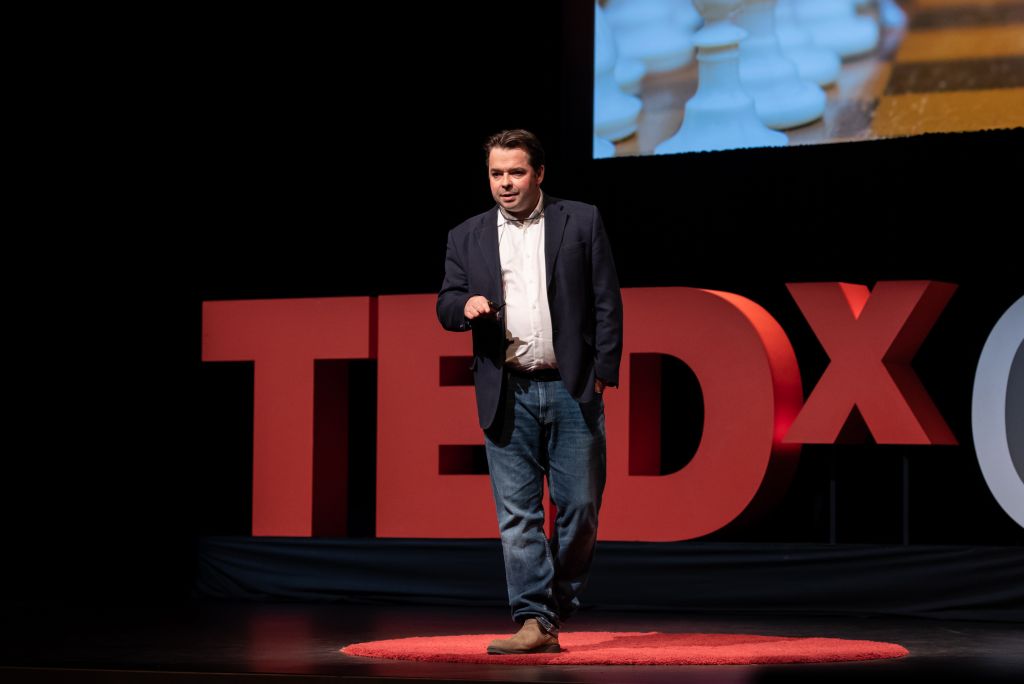Robin Grosset, chief technology officer at Mindbridge AI, was among the speakers invited to this year’s TEDxOttawa event which took place on Oct. 23 at the Algonquin Commons Theatre.
“We are standing on the threshold of another industrial revolution,” he said at the top of his speech, addressing the hushed crowd. “One of ubiquitous technology.”
Grosset’s work is informed by what he sees on the horizon: a change in the way we do things, a change in the way we learn, and the impactful ways in which AIs will be a part of this future.
“Human beings are very bad at being detail-oriented. Studies show that if a human audience is presented with two conflicting bits of information, they often wouldn’t even realize that’s the case,” he said, going on to stress the costs of this imperfection.
“Every year we find about $200 billion worth of errors and mistakes and fraud in financial data,” he said, citing information released by the Association of Certified Fraud Examiners.
“They also estimate how much we are not finding at all by any method, and that’s $3 trillion every year. That’s a little under $500 for every person on the planet. Every year [we lose that amount] to poor accounting practices or fraud. Think of the societal change it could cause if you could return $3 trillion to the economy.”
Mindbridge AI helps certified public accountants reduce such losses by detecting fraud potential and preventing mistakes. Grosset believes that every penny saved this way has powerful real-world implications.
“People don’t rob banks anymore. That’s too risky. They do something else,” he said on the subject of financial fraud specifically. “I think we are going to change significantly how people think about exploiting financial systems. Whether we will eradicate it altogether, I think there’s a possibility that will happen. I think the combination of AI and blockchain could be a great candidate for that.”
Grosset believes that the key to achieving these goals is not by simply creating and exploiting AI, but by working alongside it and learning from it, a concept known as intelligence augmentation or IA.
“As human beings we have biases,” he said. “As we grow up we develop expectations of the world. One of the nice things about AI is that it’s a blank slate. When you give them data, they often find novel and interesting approaches.”
This process not only benefits both parties – human and AI – in the short term by helping solve immediate problems, but also furthers each party’s capabilities. In his talk, Grosset provided examples of AI furthering the strategic possibilities of the ancient game Go, which had become decidedly monolithic in competitive play.
A Google DeepMind-made AI called AlphaGo defeated two of the world’s best Go players — Fan Hui in 2015 and Lee Sedol in 2016 — and in doing so, it also inadvertently taught them new ways to play the game. Fan Hui’s position in the world Go rankings soared in the months following his loss to AlphaGo.
When playing Go, AIs employ surprising and at times seemingly illogical strategies. Yet professional players analyzing them have come to see the the validity and — in Fan Hui’s words — “beauty” of their moves.
“We are talking about augmenting the human intelligence with AI,” said Grosset. “While we can use information from people to make AI smarter, intelligence augmentation is all about leveraging artificial intelligence so that it can help and advise humans.”
Many of the developmental advances Grosset works on with Mindbridge AI are based around this “human-centric” approach. One method he described consists of giving AIs nondescript data without a set goal and asking them to analyze it to determine its future importance.
“[We would ask it to] tell us the more important things about this data,” he said about using the AI. “You ask it to predict the thing you care about.”
Grosset stressed that artificial intelligence is not “to be feared,” but embraced as a catalyst to human development. Embracing it takes getting to know it, and he believes that could potentially take a lifetime of learning.
“I think the way that we learn is going to change. I think that going forward we are going to have to consider lifelong learning. Particularly with the disruption that is coming with AI,” Grosset said. “It is going to impact all kinds of professions in the next 20 years. People have to be ready for this kind of disruption, and the best defense would be lifelong learning, thinking about acquiring new skills.”


